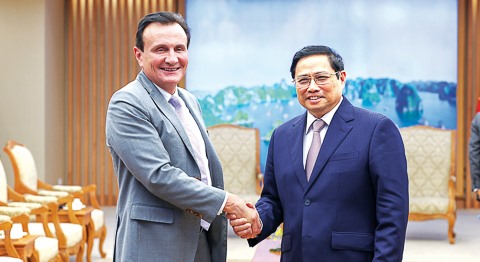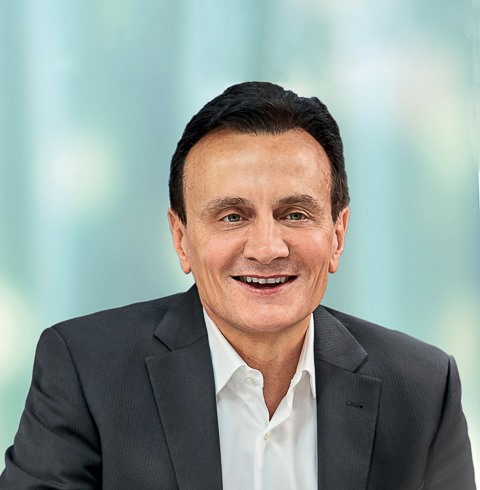

With the COVID-19 pandemic exposing the vulnerability of global healthcare systems, and decarbonisation urgently needed if we want our planet to be habitable for future generations, it is essential that sustainable approaches are embraced.
With the COVID-19 pandemic exposing the vulnerability of global healthcare systems, and decarbonisation urgently needed if we want our planet to be habitable for future generations, it is essential that sustainable approaches are embraced.

|
The Vietnamese Government and AstraZeneca have agreed to work towards a long-term, strategic partnership to comprehensively enhance healthcare and sustainable development for the benefit of Vietnamese people. VNA/VNS Photo Dương Giang.
I first visited Vietnam in the late 90s, around the same time that AstraZeneca was establishing a presence in the country. I was immediately impressed by the country, its people, and I enjoyed each of my subsequent visits. Little could I have imagined however that I would one day be invited to return to Vietnam by Prime Minister Phạm Minh Chính.
The first time the Prime Minister and I met was in Glasgow during COP26 when we spoke about the effectiveness of Vietnam’s response to COVID-19, and the substantial role AstraZeneca could continue to play in your country’s strategy.
Yesterday, with summer here and amidst a new normal, I was delighted to speak once again with the Vietnamese government, National Assembly, Ministry of Health and Ministry of Foreign Affairs. We reaffirmed our commitment to partnering over the longer term to deliver a mutual goal – to help Vietnam achieve its sustainable development targets, especially through strengthening the sustainability and resilience of its health system, for the benefit of generations to come.
As a global pharmaceutical company, we have two main motivations in making sustainability one of our priorities.
First, a focus on health system sustainability and resilience will help us to better prepare for future epidemics. COVID-19 has cost millions of lives, years of economic growth, and wreaked havoc on the livelihood of many people. We have witnessed firsthand how vulnerable global health systems are in the face of crises of this scale.
Even though Vietnam has been a success story in pandemic control, we can better guard against future damage by strengthening the health system’s capacity to respond to routine as well as unexpected challenges. To that end, building a strong domestic pharmaceutical industry to enable Vietnam to be self-sufficient in vaccines and treatments could play a significant role.

|
Mr. Pascal Soriot - AstraZeneca Chief Executive Officer
AstraZeneca is committed to supporting Vietnam in this drive, not only by supplying our vaccines and innovative medicines, but by investing VND600 billion in R&D and clinical trials over the next two years, as well as VND2 trillion in technology transfer and contract manufacturing of some of our key non-communicable disease medicines between now and 2030.
We have supported the national COVID-19 vaccination programme, protecting lives and subsequently reducing the impact of the Omicron wave, to allow the economy and tourism to fully reopen. Our COVID-19 vaccine was the first to be authorised and used in Vietnam, with over 72 million doses supplied or donated to date.
Equally importantly, with non-communicable diseases, or NCDs, accounting for over 75 per cent of the disease burden in 2019 (1) and on the rise, we have been investing and partnering with the Ministry of Health, healthcare organisations, and medical associations in the delivery of many significant health education, NCD prevention, early detection, and early treatment initiatives. These efforts are vital to reduce the pressure on the health system, ensuring that it has adequate capacity to respond to infectious disease outbreaks.
Secondly, sustainable development is crucial to combatting climate change. This is recognised by Vietnam’s commitments to achieving net-zero targets by 2050 and AstraZeneca’s leadership in accelerating the delivery of net-zero, sustainable healthcare.
COVID-19 has been the greatest public health challenge of our generation, but the impact of the climate emergency has the potential to be greater still, damaging our planet irreversibly. Moreover, climate change is a public health emergency, for which there is no vaccine, and no one is immune.
The health of our planet, people and economies is interconnected. We have seen in many places that the impact of climate change, in the form of extreme weather as well as food and water insecurities, is increasing levels of ill health (2) and disrupting the economy, while farming is also substantially affected in many parts of the world. This is leading to a rise in chronic conditions, such as heart disease, stroke, lung cancer and respiratory diseases. Decarbonisation is urgently needed if we want our planet to be habitable for future generations.
Since over 4 per cent of global greenhouse gas emissions currently come from the healthcare industry, we recognise that our sector must do more. AstraZeneca’s ‘Ambition Zero Carbon’ programme, which aims to achieve zero carbon emissions from our global activities by 2025, and ensure our entire value chain is carbon negative by 2030, demonstrates our leadership in driving change.
I am also co-chairing the Healthcare Systems Taskforce of the Sustainable Markets Initiative (SMI), launched by His Royal Highness the Prince of Wales to bring together many industries and coordinate a global effort to enable the private sector to accelerate the transition to a sustainable future. His Royal Highness has been a champion for the fight against climate change and biodiversity loss.
Looking ahead, our talented 500-plus team in Vietnam, along with colleagues around the world, remain as committed as ever to playing our part in alleviating the dual burden of infectious diseases and NCDs, protecting vulnerable and high-risk populations in this hopefully last phase of the pandemic, and partnering to help Vietnam build a sustainable health system and future.
Together, we will overcome both public health challenges and the climate emergency for the benefit of people, society, and planet. I hope to visit your beautiful country again soon.
References:
1 Roser M, Ritchie H. Burden of disease [Internet]. Our World in Data. 2021 [cited 2022May15]. Available from: https://ourworldindata.org/burden-of-disease
2 Rocque RJ, Beaudoin C, Ndjaboue R, et al. Health effects of climate change: an overview of systematic reviews. BMJ Open 2021;11:e046333. doi: 10.1136/bmjopen-2020-046333.